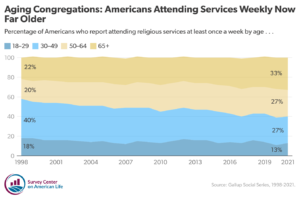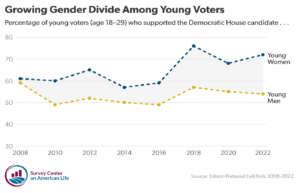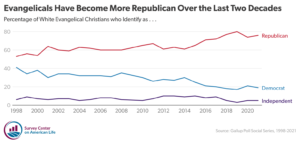All Research
Survey ReportFebruary 9, 2023
From Swiping to Sexting: The Enduring Gender Divide in American Dating and Relationships
The January 2023 American Perspectives Survey sheds some light on dating preferences, experiences, and perspectives. The national survey of more than 5,000 adults age 18 and older, including nearly 800 single adults, finds that Americans have strong dating preferences when it comes to living at home, being unemployed, and smoking.
Survey ReportJanuary 5, 2023
Faith After the Pandemic: How COVID-19 Changed American Religion
The Survey Center on American Life at AEI teamed up with researchers at NORC at the University of Chicago to measure religious affiliation and attendance both before the pandemic (2018 to March 2020) and again in spring 2022, revealing who remained at the pews, who returned to the pews, and who left.
Short ReadsDecember 22, 2022
Aging in the Pews
That churches and places of worship have struggled to attract and retain young worshipers is no secret. But new research finds that the most active congregants have gotten far older over the past two decades. In 1998, nearly six in ten (58 percent) Americans who attended religious services at least once week were under the
CommentaryDecember 20, 2022
Why Americans are Spending Less Time with Friends — And What to do About it
A full work week. Hours on housework, yard work, time spent with your kids or partner. Then there’s all the time we spend online. Where is the time for friends?
CommentaryDecember 16, 2022
Women are More Likely to Make Friends at Work than Men. Here’s Why that Matters
Research shows that the more friends we have, the less likely we are to be depressed or anxious, and work friendships boost productivity and worker retention
Short ReadsNovember 18, 2022
A Growing Gender Divide Among Young Voters
Young voters were key to the Democratic Party’s surprising performance in the 2022 midterm elections. However, there was a pronounced gender gap young voters’ candidate preference. Nearly three quarters (72 percent) of young women voted for a Democrat compared to more than half (54 percent) of young men, an 18-point difference. After Dobbs, abortion became
CommentaryNovember 18, 2022
How Hispanic Americans Think About Work and Identity
If we want to understand the evolving role of Hispanic Americans in American culture and politics, one useful on-ramp is studying Hispanics in the workplace.
CommentaryOctober 31, 2022
The New Workplace Gender Imbalance: Social Capital and Job Satisfaction
New data suggests gender and education are the difference between liking and loving your job. But there’s a price to be paid.
Short ReadsOctober 26, 2022
The Political Transformation of White Evangelical Protestants
White evangelical Christians have been an important Republican constituency for years, but their partisan commitments have undergone a remarkable change over the past two decades. In 1998, only slightly more than half (53 percent) of white evangelical Christians identified as a Republican or said they leaned towards the GOP. Twenty years later, more than three-quarters
Survey ReportOctober 25, 2022
The Social Workplace: Social Capital, Human Dignity, and Work in America
Over the past two decades, American social and civic life has been on an undeniable downward trajectory. New research finds that the workplace remains an increasingly important generator of social capital in the wake of this civic contraction.










